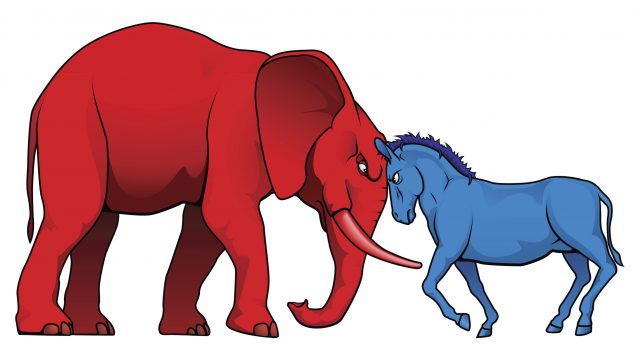Polarized Politics Aren't Necessarily A Bad Thing When You Consider The Cause

Recently the Pew Foundation released a study about Americans and politics, and found that the public seems to be much more polarized in recent years than in the past.
“The study, which surveyed a random sample of 10,000 adults, showed that the median Democrat is much more consistently liberal, and the median Republican much more consistently conservative, than they were in 2004 and 1994,” reports Garret Richie. “Also, using a scale of 10 political value questions, the overall percentage of Americans who identify at either extreme of the political spectrum — either consistently conservative or consistently liberal — has jumped from 10 percent to 21 percent.”
The percentage of Democrats who view Republicans “very unfavorably,” and vice versa, has also grown significantly.
There are a lot of opinions about why this trend is taking place. In the article, former North Dakota Senator Byron Dorgan laments the impact of talk radio and cable news on public discourse. That’s odd for a couple of reasons. First, it’s not like either of those mediums are exactly new. Both have been around for decades now, and for as often as Dorgan has condemned both since retiring he was never shy about appearing on left-wing cable news shows or talk radio before and after his time in the Senate.
What is having an impact on the polarity of American politics is the internet, but not in the way most people think.
Usually when the internet gets the blame for this sort of thing it’s bloggers like me who take the bulk of the criticism. Apparently, the conventional thinking goes, we like our pundit counterparts on talk radio and cable news are just no good for civil debate because of our divisive rhetoric and stuff (read: viewpoints other people disagree with).
It’s more complicated than that, though. I think the internet has had a polarizing impact because Americans have more information available at their fingertips than ever before, and we share our personal viewpoints more often and to a broader audience.
In terms of information, it used to be that politicians were more free to depart from ideology because the public simply wasn’t as engaged. Now with the internet facilitating more reporting and commentary on the activities of our politicians than ever before (not to mention providing wholesale and speedy access to video, voting records, etc.), politicians must be much more careful in their transgressions against their ideology. Their speeches end up on YouTube. Their votes (as well as who might have given them money to influence those votes) are easily found in minutes, if not seconds.
Voters expect politicians to behave like the candidates they elected, and what leeway an elected leader had in the past to deviate from the promises of a campaign has evaporated under the hot lights of the internet and the expectations of the voting public.
What’s more, the political debate has become much more intimate. Where it used to be that you might not know what your neighbor believed, politically, unless you had a personal conversation or spotted a bumper sticker, now you can read your neighbor holding forth about political issues on Twitter or Facebook. That’s much more intimate, much more personal and pervasive, than any ranter on talk radio or cable news could ever be.
It’s having an impact on how we view the world.
We’re retreating to our corners. We’re forming teams. There has been a lot of talk about how much more populist the nation is becoming. That’s true. We are becoming more populist, and what’s driving it is the internet giving everyone a chance to weigh in. To post a comment. To vote in a poll. To “like” or re-tweet.
From a certain perspective it’s a good thing. People are engaging. They’re communicating. They’re confronting and disagreeing and debating. That’s a healthy thing for a democratic society, but we need to realize that one side effect of it is political polarization.




